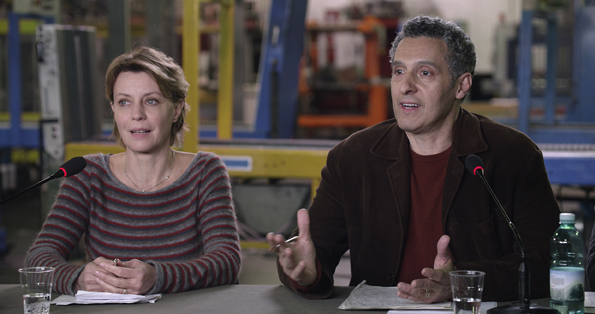Pity poor Margherita, the creation of Italian auteur Nanni Moretti. While directing a movie about the workers’ struggle, Margherita (Margherita Buy) is at her wit’s end coping with a dying mother, a willful teenage daughter, a marital separation, and the antics of a capricious star on and off her movie set. What’s Margherita to do? Moretti creates sympathy for his beleaguered main character, but Mia Madre’s unvaried pacing, busy but narrow focus, and directorial indulgences may prevent some audiences from feeling a great sense of urgency around her fate.
Margherita’s many troubles symbolize the stresses of hectic modern life, but Moretti stakes out cinematic territory in an (at least initially) endearingly old-fashioned way. Woody Allen–esque sequences play out as Margherita embarks on internal soliloquies, wakes up from confusing dreams, or confronts her younger self in a movie queue. Moretti also indulges in a tame sendup of Italy’s kooky filmmaking world, with John Turturro having a high old time chewing the scenery as an egomaniacal American actor who blows his lines and delights in trolling everyone around him, particularly the easily rattled Margherita.
For all these promising themes, a muted emotional range and unlikely characterizations prevent the film from really hitting its stride. Margherita seems awfully ditzy and indecisive for a movie director—merely a lovable quirk or reflective of mild male condescension on Moretti’s part? She faces her travails with a lot of Charlie Brown–style thinking out loud that slows down the narrative. Stagy and decorously framed, scenes all march to the same unhurried rhythm. By the time the climactic showdowns (Barry and Margherita’s on-set yelling match) roll around, they don’t pack much of a punch. A tony soundtrack featuring composers such as Arvo Part and Philip Glass inflates some rather trivial plot points with pomp and pathos.
For many viewers, the most affecting storyline will be the slow decline and death of Margherita’s mother. Joined by her somber brother (played by Moretti himself), the devoted daughter does everything she can to keep her adored mamma alive. Scenes between the two play out tenderly, if with a dollop of sentimentality and few surprises. Still, the adult children’s grief at losing a parent is perfectly relatable. Perhaps its heartfelt, gentle take on life is what earned Mia Madre the Prize of the Ecumenical Jury at Cannes. Moretti might have been better off hewing more closely to the moving, simple part of the plot than pursuing so many fussy lines of business.

















Leave A Comment